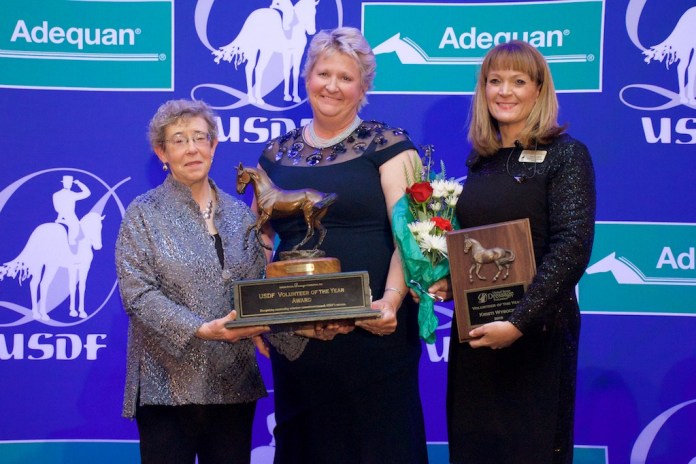
Text and photos by Jennifer Bryant
As USDF Board of Governors assemblies go, 2019 was a pretty quiet year. Only a few actions stood out from the generally uneventful meeting. Here’s a quick recap of what you may have missed.
In the only contested USDF Executive Board election, past California Dressage Society president Kevin Reinig defeated former USDF Region 2 director Kenneth Levy to become the new USDF vice president. Reinig fills the seat vacated by fellow Californian Terry Wilson, who had been appointed to a one-year interim term by USDF president Lisa Gorretta after Gorretta moved from VP to president following the 2018 convention.
The USDF Bylaws Committee proposed a renaming of the USDF Education Membership category. This little-known and little-used category (there are only about 130 education members, per USDF executive director Stephan Hienzsch) was designed to be an affordable membership option for those who don’t want or need the ability to qualify for USDF programs or awards, but it’s gained practically no traction in a decade-plus of existence.
In an attempt to rebrand and broaden the membership category’s appeal, the committee proposed the alternative name Non-Competing Membership. It was the committee’s hope, explained chair Chris Trentelman, that the name would encourage those who drop USDF participating-membership status to remain members even if they stop competing—which, Hienzsch said, is the primary reason given for not rejoining USDF.
But some Board of Governors delegates felt that the “non-competing” moniker has a negative connotation. After a freewheeling 30 minutes or so of name brainstorming and a floated suggestion that perhaps some sort of educational-materials subscription would suffice in lieu of an actual separate membership category, the BOG voted to defeat the motion. The issue is now back under consideration by the USDF Executive Board and staff.

Another motion did pass but is not a done deal because it needs consideration and approval by the USDF Executive Board and US Equestrian. Ken Levy, chair of the USDF/USEF Joint Age Division Task Force, presented that group’s proposal to the BOG: a US Equestrian rule-change proposal that would offer two age-based divisions for riders 21 and under in national classes (instead of the current single junior/young rider age division): ages 15 and under; and ages 16 to 21.
The reason for the proposal, Levy explained, is that riding skills are considerably different in young children as compared to older teenagers and young adults, and that therefore the task force felt it is unfair to ask, say, a 12-year-old to compete against a 20-year-old.
After some discussion, the BOG approved the task force’s proposal, which has the effect of making a formal recommendation to the USDF Executive Board. If the board approves, then a formal rule-change proposal would be submitted to US Equestrian for review and voting.















[…] Day Three Blog Post […]